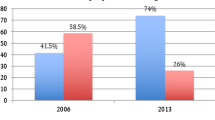Abstract
The opportunities for the integration of developing countries and the limitations to such integration have not received enough attention in the scientific discussion on the reform of the international economic order, with the result that a considerable research backlog has been accumulating in this field. The following article shows that the established integration theory which has been evolved primarily with the problems of the European integration movement in mind is not able to evolve adequate criteria for decisions on integrations of developing countries.
Similar content being viewed by others
References
Jacob Viner, The Customs Union Issue, Carnegie Endowment for International Peace, New York 1950, esp. chapter 4.
Richard G. Lipsey, The Theory of Customs Unions: Trade Diversion and Welfare, in: Economica, N.S. Vol. 24 (1957), p. 40–46; the same author, The Theory of Customs Unions: A General Survey, in: Economic Journal, Vol. 70 (1960), p. 496–513; the same author, The Theory of Customs Unions: A General Equilibrium Analysis, London 1970.
Franz Gehrels, Customs Unions from a Single Country’s Viewpoint, in: Review of Economic Studies, Vol. 24 (1956/57), p. 61–64. Cf. the same author, Optimal Restrictions on Foreign Trade and Investment, in: American Economic Review, Vol. 61 (1971), p. 147–159.
Robert L. Allen, Integration in Less Developed Areas, in: Kyklos, Vol. 14 (1961), p. 315–336.
Raymond F. Mikesell, The Theory of Common Market as Applied to Regional Arrangements Among Developing Countries, in: Roy Harrod, Douglas Hague (Eds.), International Trade in a Developing World, London, 1963, p. 203–240, quoted p. 213.
Albert Breton, The Economics of Nationalism, in: Journal of Political Economy, Vol. 72 (1964), p. 376–386.
Charles A. Cooper, Benton F. Massell, Toward a General Theory of Customs Unions for Developing Countries, in: Journal of Political Economy, Vol. 73 (1965), p. 461–476; the same authors, A New Look at Customs Unions Theory, in: Economic Journal, Vol. 75 (1965), p. 742–747.
Harry G. Johnson, The Economic Theory of Customs Unions, in: Pakistan Economic Journal, Vol. 10 (1960), p. 14–32, reprinted in: The same author, Money, Trade, and Economic Growth, London 1962, p. 46–72. Cf. also the same author, An Economic Theory of Protectionism. Tariff Bargaining, and the Formation of Customs Unions, in: Journal of Political Economy, Vol. 73 (1965), p. 256–283.
R. S. Bhambri, Customs Unions and Under-Developed Countries, in: Economica Internazionale, Vol. 15 (1962), p. 235–258.
Fuat Andic, Suphan Andic, Douglas Dosser, A Theory of Economic Integration for Developing Countries. Illustrated by Caribbean Countries, London 1971, especially p. 41.
Bela Balassa, Towards a Theory of Economic Integration, in: Kyklos, Vol. 14 (1961), p. 1–17, particularly p. 12.
Bela Balassa, Towards a Theory …, op. cit., p. 13.
Author information
Authors and Affiliations
Additional information
Freie Universität Berlin.
Rights and permissions
About this article
Cite this article
Bahadir, S.A. Problems of integration theory in relation to the developing countries. Intereconomics 13, 174–178 (1978). https://doi.org/10.1007/BF02929189
Issue Date:
DOI: https://doi.org/10.1007/BF02929189




